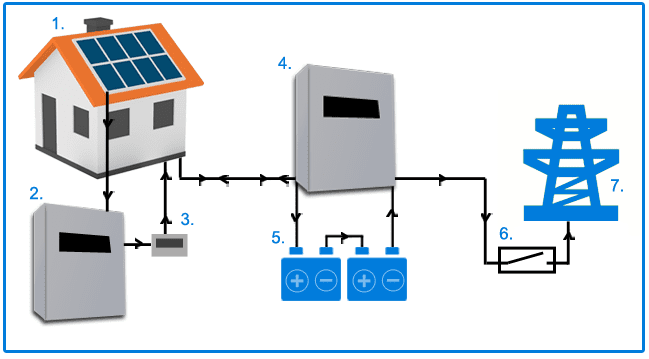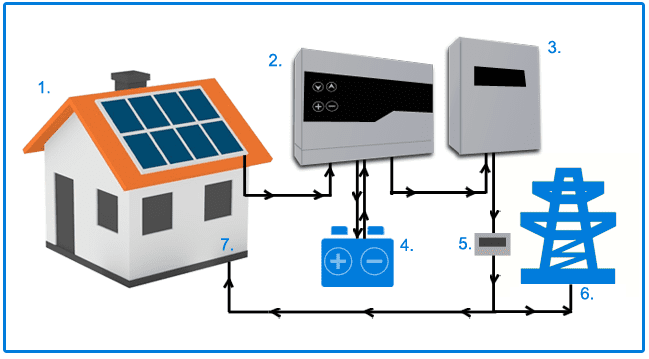The Benefits of Installing Solar Battery Storage to your home or business.

How can we help you save more on your electricity bill?
We can install solar panel battery storage that could enable you to use 100% of the solar energy you generate.
In a world where electricity is becoming in short supply and more expensive, can you afford not to use every unit of electricity you produce?

An Overview of how a typical house would save using a battery storage system.
The video below is a great demonstration of how installing a battery storage system to a solar installation could benefit a household. The system shown is the SolarEdge StorEdge solution. One of the three main systems we like to use. Most systems work in this way, so it’s worth watching, whichever system you end up going for.

Solar panel battery storage is fast becoming the next big thing within the renewable industry and installers are constantly being asked to install them.
You may want to store power generated by your solar panels or another source such as a generator, the grid or other renewable energy.
There are several options available for storing electricity. Depending on what you want to achieve.
Three of the most common configurations are: 1. Grid Interactive, DC Coupled and Off grid.
Grid Interactive (also known as Grid Coupled)

Diagram: Grid Coupled System.
A grid interactive battery storage system works in tandem with the electricity grid. The storage system is connected to the grid and the solar panels then assist with charging the batteries. The solar energy can then be used either:
at night,
during the day
or whenever it is needed.
The feed in tariff is unaffected because you are still connected to the grid and your payback meter will still be counting all the units as normal.
In the event of a power cut, the system would disconnect from the grid automatically and the solar panels would continue to charge the batteries. This would mean that you can still enjoy a few basic consumables like the TV, lighting, some power sockets, the central heating controls and other low energy items.
It is a scalable system. It is designed for you based on how many batteries you need to install and how many solar panels you have to charge them!
More on grid coupled battery solar storage
In simple terms, Grid Coupled Solar Battery Storage is where you add a battery set to a regular Solar PV System. It can be installed as a retro-fit battery storage system to add to an existing solar panel array or as a part of a new solar panel installation.
The batteries store the electricity that your solar panels generate. You can then use that power at night, during the daytime or in the event of a power-cut. The grid coupled system will also keep the solar panels working and charging the batteries even if there were to be a power cut.
How does Grid Connected Solar Battery Storage Work?
- Solar Panels
The Direct current (DC) travels into the solar inverter as normal. Other renewables can also be used such as Wind turbines etc. - Solar Inverter
The Solar Inverter turns the Direct Current (DC) into Alternating Current (AC) the power then gets sent to the battery inverter. If the batteries are full then power is sent to other appliances or the national grid. - Payback Meter
Before the power either gets used or sent for storage it is counted as normal on the feed in tariff payback meter. - The Battery Inverter / Controller
The Alternating Current (AC) then gets sent to the battery inverter which converts the energy from AC to DC and is stored in the batteries. The inverter then converts the DC from the batteries back to AC when the power is needed. - The Batteries
The batteries store the power until needed in the home or business. - Off-Grid Cut Off Switch
If the grid fails then an automatic switch kicks in and switches to off-grid mode, allowing your solar panels to continue to charge your batteries and the grid to be completely isolated. - The National Grid
The system is also grid connected so if there is any surplus power then this is sent back as normal.
As said before, this is a scalable system. You can, pretty much have any size of storage capacity. A typical domestic system costing around £4,500-£7,500 will be able to store between 6-12kWh’s of electricity giving 3-6kWh’s of useable storage.
Direct Solar Power Storage (also known as DC Coupled

This is a popular option as it’s quick and easy to install. It’s also low cost compared to other storage systems.
You may have seen or heard of some inverters that have a battery installed inside them. This is known as a hybrid system.
The solar power is stored up and can then be used at night or when solar generation is low. It can also be installed as retro-fit to your existing inverter by installing a battery and controller inline, before the inverter. This is essentially all a hybrid inverter is anyway.
The solar power is stored as DC and uses the solar inverter to convert the electricity back to AC.
The drawbacks are that if your home was to have a power cut, your inverter will shut down. Therefore no battery back-up like the grid interactive system.
If you like the sound of the DC coupled system read on..
Put simply the DC coupled system is a battery that acts a store or buffer for the solar energy.
Solar electricity is generated and stored straight into the battery for use later.
When the energy is needed (or the battery is full) the solar energy continues its journey as normal through the inverter, payback meter and then to either the grid or use in your home.
The idea is that the solar battery storage is storing the energy for use at night, or when it’s needed in the home.
DC Coupled is also the same as Hybrid Solar PV Battery storage.
The battery either makes up part of the inverter or is installed in a separate housing next to the inverter.
An inverter with the battery already built in is known as a Hybrid inverter.
solar battery storage dc coupled
- Solar Panels
The Direct current (DC) travels into the solar controller. - Solar Storage Controller
If the Battery has capacity then the energy is stored. - The Inverter
When the energy is needed or the battery is full the power travels through the inverter. - The Battery
Is housed inside a case and is used to store the power from the panels. - Payback Meter
All power collected goes through the generation meter measured for the feed in tariff. - The National Grid
Worst case scenario the power is diverted to the grid should it not be used and there is no space left in the batteries. - Building
The power stored in the batteries can be used in the home or business.
Off grid solar battery storage
Off-grid (Also known as Grid independent)
Solar power is a great solution for someone who doesn’t have access to the grid.
Using solar power with battery storage is a great way to provide off-grid power, we see it as another service that we offer so have dedicated a page to our off grid wing.
What are the benefits of Solar Panel Battery Storage?
Increase your self-consumption by storing any excess energy you generate. Utilise Time of Use tariffs (ToU) if you have extra cheap off peak rates you can charge your battery for use when electricity is otherwise expensive. Use your stored solar power in Morning and Evening consumption peaks, rather than when it is generated.
How much does Solar Battery Storage cost?
Installed, you are looking at anything between £2500 – £10,000 depending on battery capacity, type of product and ease of installation.
To summarise there are three different types of Solar battery storage systems that we can install. Solar interactive, DC coupled and Off-grid. The option you choose will depend on your requirements and what you need.
It is important to note that battery storage products are not MCS registered.




